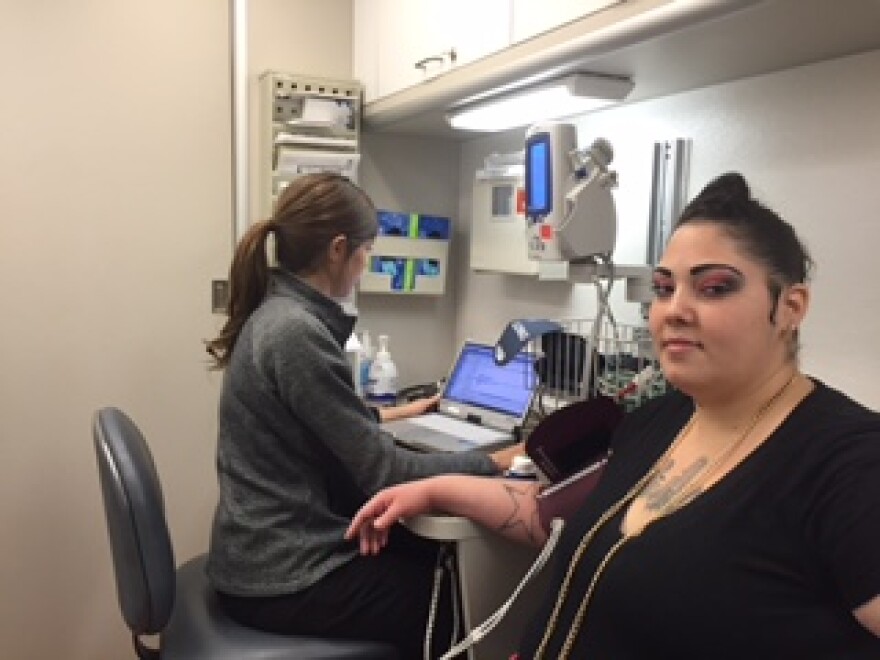In Texas, we’re all about convenience. The drive-through Starbucks, burger joint, even drive through bank. Still, there aren’t any drive through health clinics…the closest thing are clinics on wheels run by Parkland, Dallas' public hospital. Those have been crisscrossing the city of Dallas for more than a decade, serving the people in the community that need it most.
Parkland’s mobile health clinics look like a mix between an RV, a school bus, and a doctor’s office.
There’s only forty feet to work with, but they’ve managed to squeeze in four separate rooms: the patient waiting area, the nurse’s office, an exam room, and a doctor’s office.
People hop on, check in, and get labs drawn just like a normal clinic. Patient Hannah Salam is in the middle of an appointment, getting weighed and then slipping her tattooed arm into the blood pressure cuff.

“When I first came in I was kind of surprised it was really set up like a medical facility,” she says. Salam got out of prison a few months ago and is staying at a halfway house before she’s off parole.
She’s on this van to get the results of a lab test she got on another of Parkland’s mobile vans a week before. This kind of follow up sounds mundane, but it’s fundamental to treating people on the move.
In the back of the van, past a bathroom and some noisy generators, is the physician assistant’s office. Shakira Johnson’s been working on this bus for three years.
“I think the main challenge is once [patients] leave is making sure they stay in medical care,” Johnson says. “Their priority is where they’re going to eat and sleep the basic living conditions.”
The total homeless population in Dallas and Collin County increased 21% over the 2015 Count, going from 3,141 to 3,810 individuals according to the Metro Dallas Homeless Alliance’s annual report

Dr. Susan Spalding, Medical Director of the Parkland Homeless Outreach Medical Services Program, says these folks face the same health problems as everyone else -- high blood pressure, diabetes, asthma, but they have issues with transportation, health insurance and with getting prescriptions. The mobile vans make it as easy as possible to get help, and they’ve been a success. In 2015, more than nine thousand homeless Dallas residents -- including 1,655 kids -- have been aboard for care.
“Many people throughout the country use mobile clinics twice a week, Spalding says. “We run Monday through Friday, 8 in the morning to sometimes 8 at night. There are a lot of people in and out.”
Across the country, the mobile health clinic is having a bit of a renaissance.
“There are lot of mobile clinics right now, many more than people might imagine,” says. Hill is Principal Investigator of “Public Health Quality and Mobile Clinics at Harvard Medical School.
She says there are more than 2,000 mobile clinics in the U.S. Hospitals are sending out these clinics on wheels because they’re shifting their focus from the ER to preventative care, which saves money.
“We’ve estimated that an average visit to a mobile clinic costs the funder $155 dollars but saves twelve times that in terms of long term benefits and avoided emergency department visits,” she says.
So, if it’s so great, why not more people doing it? Hill says part of the reason has to do with perception.
"People have perceived it because it’s in the community as being lower quality. So that’s why we’re trying to build the evidence base around it so people are aware of it as a tool to help health care systems improve the health of those who need it most," she says.






